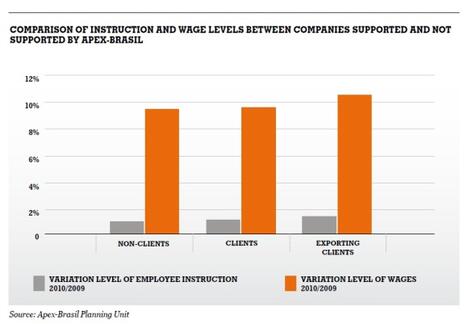Apex-Brasil: A study of internationalization
The Brazilian Trade and Investment Promotion Agency (Apex-Brasil) works closely with the Brazilian Ministry of Development, Industry and Foreign Trade to promote exports of Brazilian goods and services, and attract foreign direct investments into strategic sectors of the Brazilian economy. Building on its corporate vision to promote Brazil as an innovative, competitive and sustainable country, Apex-Brasil’s mission is to 'develop the competitiveness of Brazilian companies by promoting the internationalization of their business and attracting foreign direct investments.'
To achieve this mission, Apex-Brasil has redesigned its value chain so that companies supported by its services can increase their export maturity and, therefore, their international competitiveness. The value chain assumes companies with different export maturity levels will require different types and scopes of services to achieve a strong competitive position in international markets. This assumption was confirmed by the results of a survey conducted by Apex-Brasil among more than 2,000 Brazilian companies in the third quarter of 2011. The results show a correlation between company export maturity levels and areas of development need. The analysis of respondents´ priority needs in each of the five export maturity levels shows that their progression through the internationalization cycle could be split into three main stages: international insertion, consolidation in international markets, and expansion of international operations.
Click on the image to see the full size
The international insertion stage is the first challenge for non-exporting companies and beginner exporters. These companies are characterized by the need to develop skills to correctly define export markets and improve management competence in areas such as cash flow management, quality standards and production processes before making their first international transactions.
Companies in the second stage of export development, consolidation in international markets, are characterized by some export success, but needing to establish a competitive international strategy that diversifies client portfolios and increases exports. This will ensure that these companies are moving towards a higher level of maturity in the internationalization cycle. At this stage, it is essential that companies understand their market-entry options, develop innovative brand positioning activities in target markets, and increase external sales in a sustainable way.
The final stage, expansion of international operations, is characterized by companies that are mature in international markets and seek to diversify market entry models by adopting a variety of organizational models in different countries, perhaps opening stores and distribution centres, or making franchise and license agreements. Companies at this stage need customized capacity building programmes and consultancy services in subjects related to their target markets, such as value chain analysis, competitor assessment and investment appraisal.
By matching the needs of companies with the service categories offered by Apex-Brasil – market intelligence, entrepreneurial training, internationalization strategies, business and image promotion, and investment attraction – the Apex-Brasil value chain guides clients through a development process that leads them to higher levels of competitiveness and greater business generation in external markets. The ultimate goal of the value chain is to aid companies in the development of sustainable competitive advantage and sustainable exports. International competitiveness then reaches higher levels and generates a positive impact on both the country and company.
For a company to achieve competitive status in its chosen market or markets, it must go through an export development process that starts with broadening its knowledge of external market opportunities and moves on to adapting its management practices to meet strategic goals, managing resources to get its products or services properly into to the target market, producing offers and conducting business transactions. The changes make a company move through heightened awareness about markets and changes behaviour to improve management practices that may lead it to make better international deals.
The service categories in the Apex-Brasil portfolio are designed to respond to a range of management and business needs in the internationalization cycle. Services in the market intelligence category aim to raise awareness about market opportunities, whereas services in the categories of entrepreneurial training and internationalization strategies aim to change specific managerial behaviour, such as strategic design and planning. Services in the categories of business and image promotion and investment attraction aim to support business generation.
The three stages of the internationalization process each bring their own challenges as the export development process is not linear, but cyclic. By going through the cyclical process of raising awareness of new market opportunities, changing management behaviour to satisfy market specificities and generating business over and over again, a company will, over time, enhance its export maturity and eventually achieve sustainable international competitiveness.
To measure evolution through the cycle and to guarantee that its clients become international competitors, Apex-Brasil has developed an impact and results measurement system with the support of the ITC Trade Support Institutions Strengthening Section.
Click on the image to see the full size
One of the key elements of a company’s competitiveness is the quality of its human resources. Therefore, one of the parameters defined in Apex-Brasil’s impact and results measurement system is employment, or job generation. Apex-Brasil’s goal is not only to facilitate job generation, but to foster the generation of qualified jobs through services that encourage improved human resources management. This means a company going through the Apex-Brasil value chain should, over time, develop stronger internal human resources competencies and, consequently, gain a more highly qualified and better paid workforce. Having access to high-quality skills and know-how means that a company can develop a culture of innovation and improved design, and offer sustainably produced, profitable products and services to external markets.
To isolate the impact of Apex-Brasil services on clients, Brazilian government statistical databases are merged with Apex-Brasil’s customer relationship management database, allowing for the creation of proxies such as those shown in the graph (below) comparing instruction and wage levels between companies supported and not supported by Apex-Brasil. The graph shows that companies supported by Apex-Brasil have employed staff with higher education levels and higher wages than those not supported by the agency. Moreover, in the group supported by Apex-Brasil, exporting companies presented higher levels of education and wages than companies that were not yet exporting.
This evidence corroborates the concepts behind Apex-Brasil’s internationalization cycle and traditional internationalization theories: better qualified companies perform better in external markets, and better performance in external markets leads to improved internal company competencies.
In line with these theories, Apex-Brasil’s value chain seeks to develop internal company competencies in order to make companies more competitive in international markets. By fostering the adoption of specific and needed managerial practices and the inclusion of features that differentiate Brazilian products and services by attributes other than price, Apex-Brasil encourages the generation and ongoing improvement of a skilled and well-managed workforce. In the long term, this will contribute substantially to the sustainable international competitiveness of Brazilian companies and increase the country’s wealth generation.











